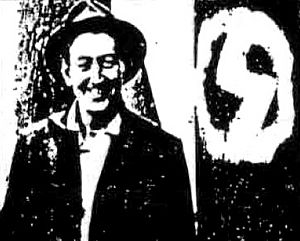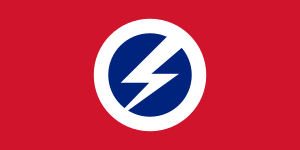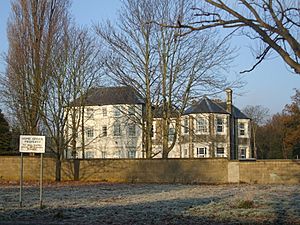Charlie Watts (fascist) facts for kids
Quick facts for kids
Charlie Watts
|
|
|---|---|

Charlie Watts with the BUF flag
|
|
| Born |
Charles Frederick Watts
17 January 1903 Croydon, UK
|
| Died | 1971 (aged 67–68) |
| Nationality | British |
| Known for | Activist in the British Union of Fascists, World War II detainee |
Charles Frederick Watts (born January 17, 1903 – died 1971) was a British man who was a member of a political group called the British Union of Fascists. He was held in special camps during World War II.
In his younger years, Watts served in the Royal Air Force, which is the UK's air force. Later, in the 1930s, he joined the British Union of Fascists. He was very active in getting new members for this group. When World War II began, he was arrested and held in different places, including Brixton Prison and a special camp called Camp 020.
He was later moved to an internment camp in Ascot. There, he became a leader for the other people held there. He even started a newspaper called The Flame. He also talked with the camp officials for the other people. Watts was released in 1941. He continued to be involved with the fascist movement after the war. He wrote a book about his time in detention called "It Has Happened Here".
Early Life of Charlie Watts
Charlie Watts was born in Croydon, Surrey, England, on January 17, 1903. His father, Alfred Ernest Watts, was an accountant. His mother was Lilian. He was christened at St Peter's Church in Croydon. He had a brother named O. M. Watts, who was a master mariner.
Watts worked as an aircraftsman in the Royal Air Force. He stayed in the reserves, meaning he could be called back to serve, until 1936.
Watts and Fascism
Charlie Watts joined the British Union of Fascists (BUF) in the 1930s. He became a leader for the Westminster, St George's branch of the group. He was very good at finding new members. He even convinced people who had disagreed with him before to join.
Watts also organized a group for taxi drivers who were part of the BUF. This group was said to have 1,000 members. He suggested to another member, Susan Sweney, that she become the editor of a fascist newspaper.
Watts worked for his brother Oswald in London. On May 23, 1940, he was arrested there by the British police. This happened during a time when many British fascists were being rounded up. It was after World War II had started. He was first held at Brixton Prison. Then, he was moved to Camp 020 at Latchmere House for questioning.
Later, he was moved to Ascot internment camp in Berkshire with other BUF members. This camp was set up quickly. Watts became the unofficial leader there. He created a newspaper called The Flame. He also spoke with the camp authorities for the other people held there. He became good friends with James Larratt Battersby during this time. Being held in these camps made many BUF members feel they had been treated unfairly. For Watts, this experience was a very important part of his life.
Many fascists were released by the government if they were not seen as a threat. Watts was released in 1941. He had some rules about where he could go. In November 1942, he helped organize a party for Oswald Mosley's birthday. Mosley was a leader of the BUF. At this party, Watts gave a speech. He wore his BUF uniform, which was against the law by then. He said that the British fascist movement should stay together. He also said it was a British group.
After the war, Watts continued to be involved with British fascism. However, he realized the movement could not become strong again. This was because people connected it with the Nazis. Most former BUF members did not want to be linked to the Nazis. Watts wrote in his book:
We were now being held responsible for and answerable for all the vile Nazi atrocities ... I gradually but surely came to the conclusion that I was not wasting my life on people who were not worth the effort ... I was no longer going to knock my head against a brick wall.
Death and Legacy
Charlie Watts passed away in Penzance, Cornwall, in 1971. His book about being held during the war, "It Has Happened Here", was published after he died. It appeared in a newsletter called Comrade starting in 1986. A copy of his original handwritten book is kept at the University of Sheffield library. Official documents about his time in detention are held by the British National Archives.
Images for kids
 | Roy Wilkins |
 | John Lewis |
 | Linda Carol Brown |




